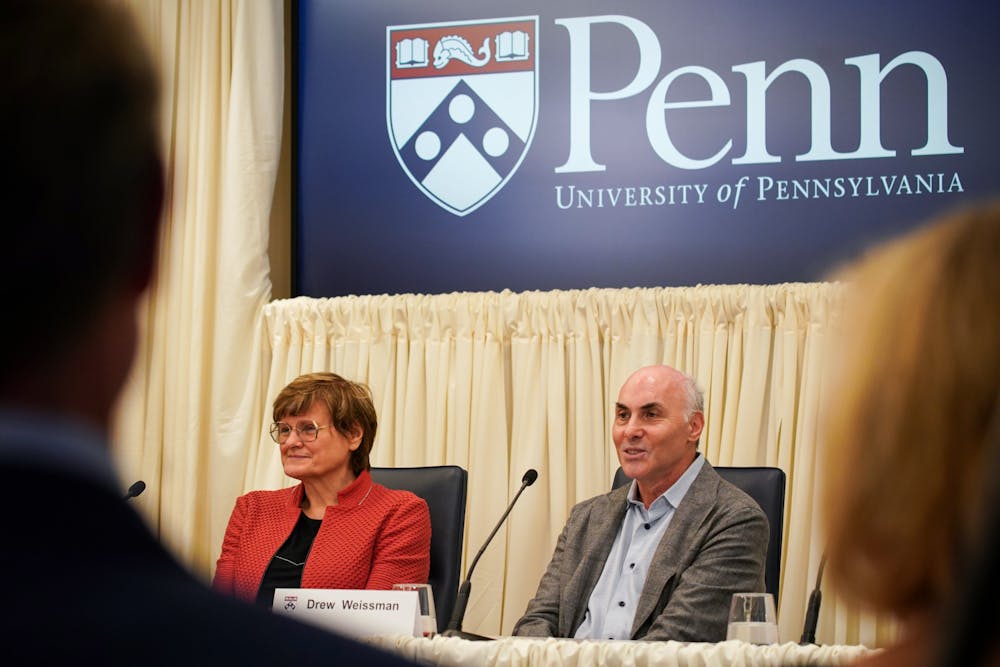
Penn Medicine researchers Katalin Karikó and Drew Weissman were named winners of the 2023 Nobel Prize in Medicine on Monday.
Karikó, an adjunct professor of neurosurgery at the Perelman School of Medicine, and Weissman, the Roberts Family Professor of Vaccine Research at the Perelman School of Medicine, won the award for their past research into messenger RNA technology on Oct. 2. Their research — primarily a groundbreaking 2005 study — was critical in the development of Pfizer/BioNTech and Moderna’s COVID-19 vaccines.
Penn President Liz Magill congratulated Karikó and Weissman on their accomplishments at a press conference this morning.
“We are bursting with pride of our Nobel laureates and the extraordinary work they have done to serve so many across the globe,” Magill said. “At a University built around [a] Franklin spirit, there are no better exemplars of these character traits than our Nobel laureates, Dr. Kati Karikó and Dr. Drew Weissman.”
More than 655 million doses of mRNA COVID-19 vaccines have been administered since their release in December 2020, according to Penn Today.
Executive Vice President of the University of Pennsylvania Health System and Dean of the Medical School Larry Jameson emphasized the magnitude of Karikó and Weissman’s findings at the press conference.
“The achievements of Dr. Weissman and Karikó have changed the course of history,” Jameson said. “Since the rollout of two mRNA vaccines in 2020, millions of lives have been saved, and scores of others have been protected from severe disease, even in the face of an increasingly transmissible virus.”
In the 1990s, Karikó was on the path to professorship at Penn, but she was demoted after the University saw her work as too financially risky to fund. She stayed at Penn until 2013 but was never reinstated to her position even after the University patented the technology from Karikó and Weissman’s 2005 research.
“Ten years ago I was here in October because I was kicked out and forced to retire," Karikó told the Nobel Prize organization.
A flash mob event celebrating Karikó and Weissman took place following the morning press conference outside Smilow Commons at 1 p.m. Magill, Jameson, Kevin Mahoney, CEO of UPHS, and Jon Epstein, executive vice dean and chief scientific officer of the Medical School, were all in attendance.
Weissman stated at the press conference that mRNA-based trials are currently in process for seven vaccines, including cancer vaccines, vaccines for autoimmune diseases, and allergens.
"My lifelong dream has always been to put something that I developed into people and to have it make a difference,” Weissman previously told The Daily Pennsylvanian in 2020.
Karikó and Weissman have since won a multitude of awards for their research. Among others, they have been named TIME Magazine’s Heroes of the Year, awarded the 2021 Lasker-DeBakey Clinical Medical Research Award and the 2022 Breakthrough Prize in Life Sciences, and inducted into the National Inventors Hall of Fame.
Karikó and Weissman become the 28th and 29th Nobel laureates affiliated with Penn and join nine prior Penn-affiliated Nobel laureates who have won the Nobel Prize in Medicine.
Penn-affiliated Nobel Laureates over the last century
Karikó and Weissman first met in 1997 while waiting in line to use a copy machine. They soon began working together on mRNA research.
In 2005, Karikó and Weissman published research that found that mRNA could be changed in a laboratory and used for therapeutic purposes. They discovered that modifying RNA using a naturally occurring modified nucleoside could reduce RNA’s inflammatory potential and cause a higher production of antigenic protein, which is critical for vaccine development.
“We would sit together in 1997 after work and talk about all the things we thought RNA could do — all of the vaccines, therapeutics, and gene therapies — and then just realize it had the potential to be, and that is why we never gave up,” Weissman said at the press conference.
The Daily Pennsylvanian is an independent, student-run newspaper. Please consider making a donation to support the coverage that shapes the University. Your generosity ensures a future of strong journalism at Penn.
Donate







